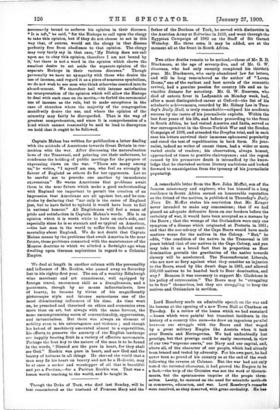Two other deaths remain to be noticed,—those of Mr. R.
D. Blackmore, at the age of seventy-five, and of Mr. G. W. Steevens, who had only recently completed his thirtieth year. Mr. Blackmore, who early abandoned law for letters, and will be long remembered as the author of "Lorna Doone," one of the earliest and best novels of the romantic revival, had a genuine passion for country life and an in- vincible distaste for notoriety. Mr. G. W. Steevens, who died of enteric fever in Ladysmith on Monday week, had, after a most distinguished career at Oxford—the list of his scholastic achievements, recorded by Mr. Sidney Lee in Tues- day's Daily Mail, is truly remarkable—eclipsed his academic success by the lustre of his journalistic exploits. Within the last four years of his life, and before proceeding to the front in South Africa, he had visited America and India, served as war correspondent in the Greco-Turkish War and the Soudan Campaign of 1898, and attended the Dreyfus trial, and in each case his letters survived their immense ephemeral popularity and stood the test of republication in book form. No jour. flatlet, indeed no writer of recent times, had a wider or more varied circle of readers ; his observation, always honest, approached at times to positive clairvoyance ; and the regret caused by his premature death is intensified by the know. ledge that he cherished serious literary ambitions and looked forward to emancipation from the tyranny of his journalistic popularity.


















































 Previous page
Previous page